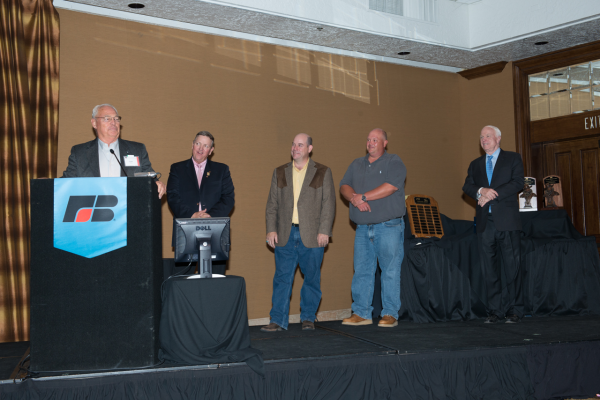Cotton Farmer Named Arizona Agriculture's Farmer of the Year
Published
11/13/2014
By Julie Murphree, Arizona Farm Bureau: Arizona cotton, wheat, and alfalfa farmer Clyde Sharp has been a tireless and highly effective advocate for the Arizona cotton industry for more than twenty years. In 1991, Sharp was elected to the Arizona Cotton Growers Association Board of Directors and began the slow process of becoming a leader on behalf of the industry. He observed in 1999 when the Arizona cotton producers rejected a Pink Bollworm Eradication Program. He had personal concerns with this knowing how devastating this pest is to the cotton plant.

Clyde Sharp speaks to the audience after receiving Arizona Farm Bureau's 2014 Farmer of the Year recognition last Thursday night. On stage with him are Arizona Farm Bureau President Kevin Rogers (nearest podium), Arizona House of Representatives David Gowen, Yuma County Farm Bureau President Mark Loghry and U.S. Senator John McCain. Senator McCain spoke to the group earlier that evening discussing several issues including border security, immigration reform, the election results and more. The Senator helped Arizona Farm Bureau give out the awards.
In 2003, Sharp was elected President of the Arizona Cotton Growers and determined that, notwithstanding a failed referendum in 1999, to try again. Many in the industry believed that the Arizona cotton producers had settled the issue of eradication. Sharp believed otherwise.
As a two-term member of the Arizona Cotton Research & Protection Council (ACRPC), he fought for improvements in plow-down regulations, targeted research funding and
The value of such pest control efforts might be lost on the uninitiated especially since the program and control of the pest
Ultimately, fewer chemicals are used.
A real testimony to Sharp’s dedication to any and all novel approaches to benefit the Arizona cotton industry was demonstrated in his willingness to take a young scientist under his wing in the 1990’s. Sharp, and his brother, David, provided fields,
Sharp’s determination and positive attitude when presented with difficult challenges cannot be overstated. His contributions to the Arizona cotton industry specifically, and to the agricultural community as a whole, is why Arizona Farm Bureau recognized Sharp as the 2014 Arizona Farmer of the Year.
“Clyde, like most cotton growers, is a gambler,” said Arizona Farm Bureau President Kevin Rogers. “But Clyde had to really test the limits, if not the patience, of his own colleagues and the industry to get this pest issue resolved. We’re proud of the work he’s done on behalf of the industry. ”